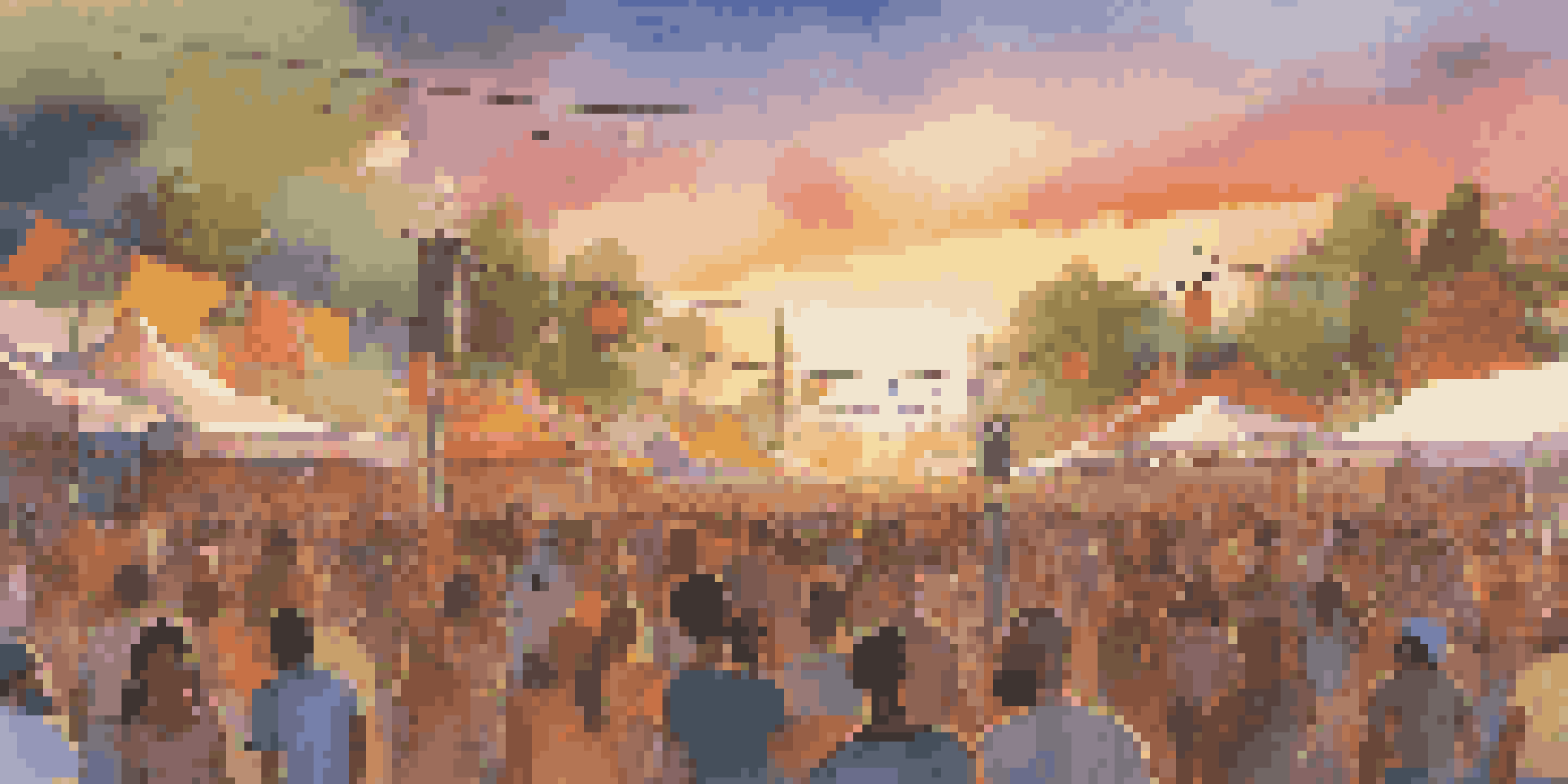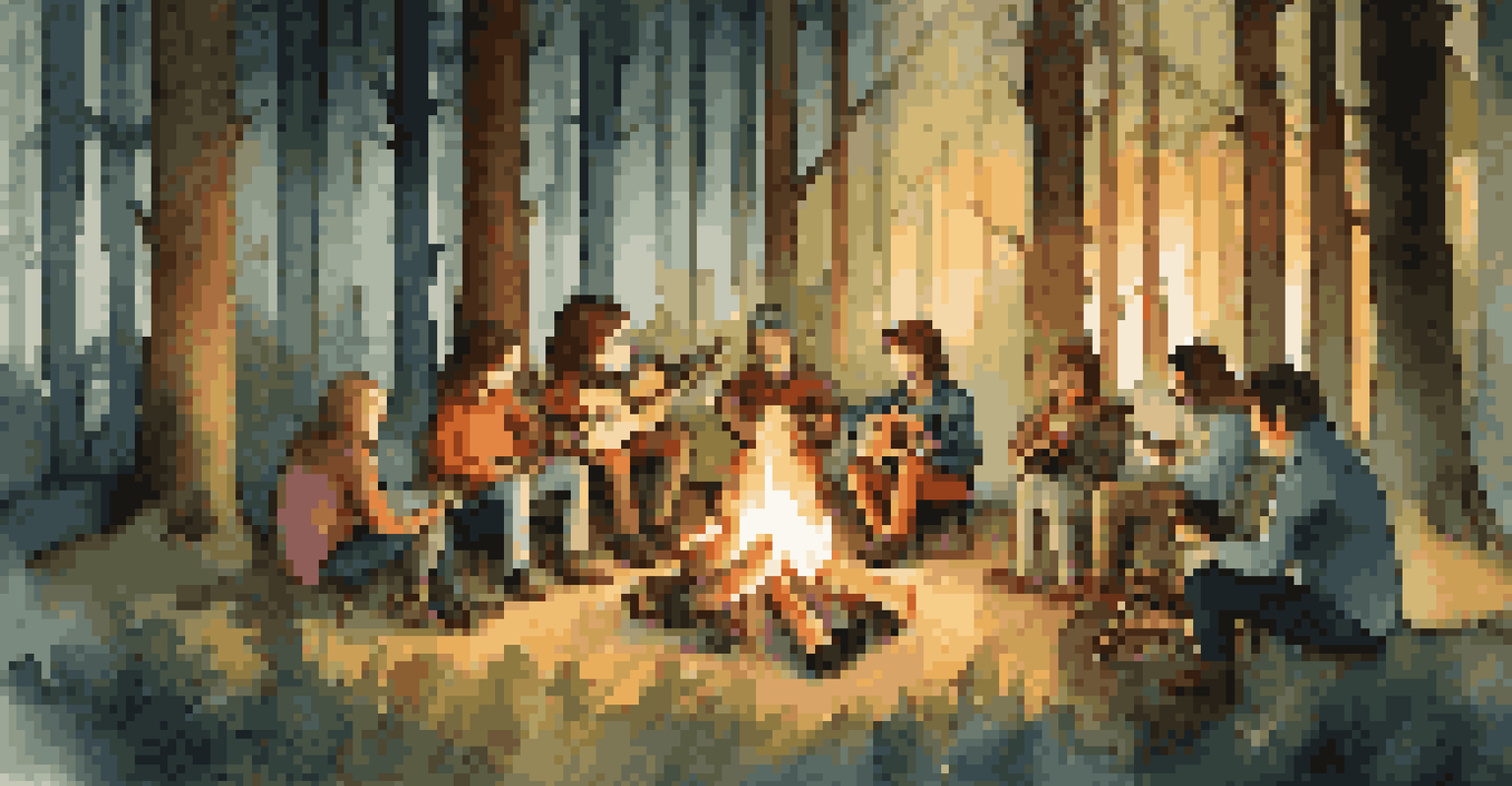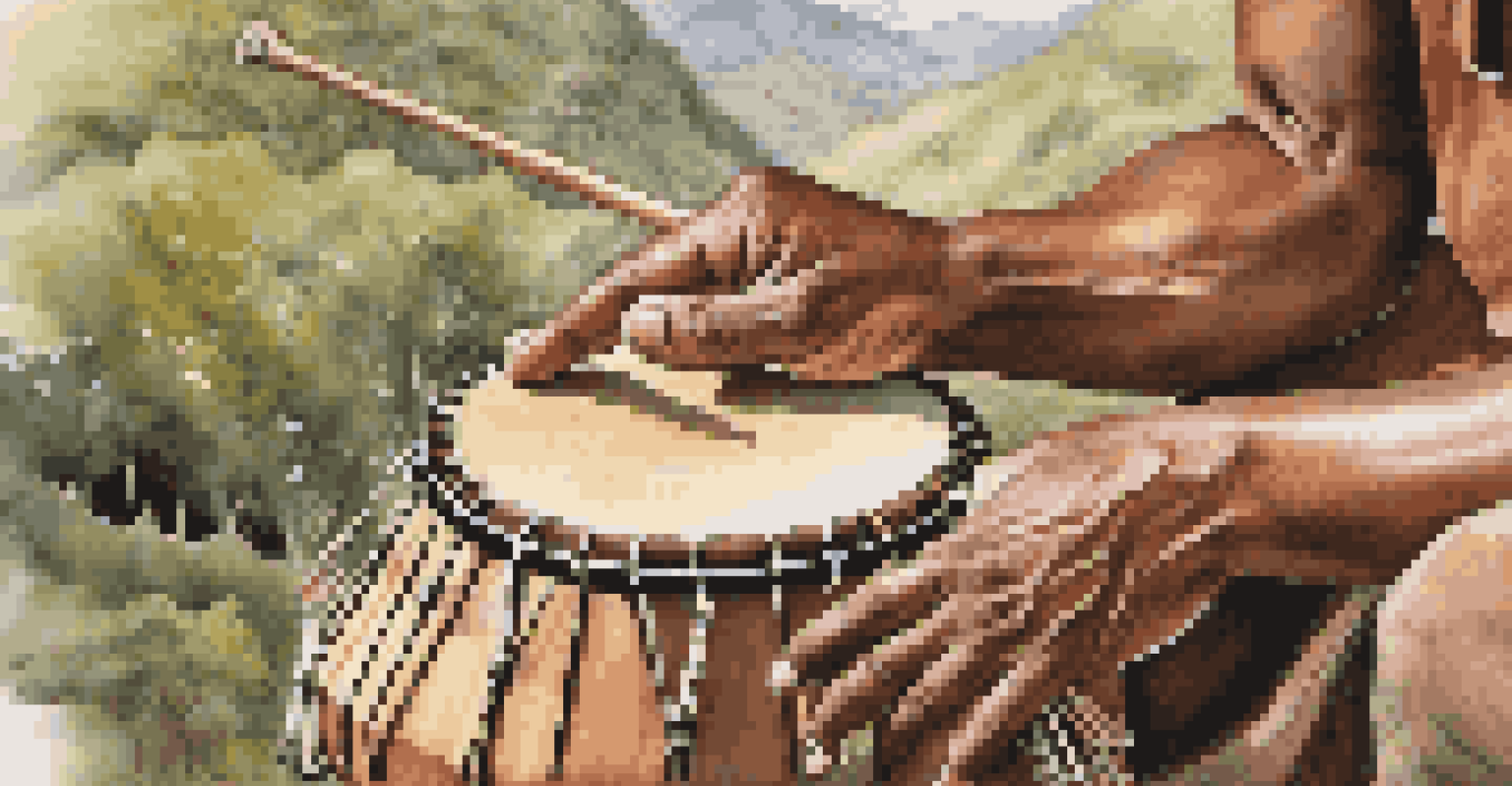The Role of Music in Shaping Collective Cultural Memory

Understanding Collective Cultural Memory Through Music
Collective cultural memory refers to the shared pool of knowledge and experiences that shape a community's identity. Music plays a pivotal role in this process, acting as a vessel for stories, traditions, and emotions passed down through generations. By resonating with collective experiences, songs can evoke powerful memories that unite people from different backgrounds.
Music can change the world because it can change people.
For instance, national anthems often stir feelings of patriotism and belonging, solidifying a shared identity among citizens. Similarly, folk songs can encapsulate historical events or cultural practices, preserving them for future generations. Through these musical expressions, communities can maintain a sense of continuity and connection to their past.
Ultimately, music serves as a bridge between generations, allowing individuals to engage with their cultural heritage. This connection fosters a deeper understanding of one's identity and place within the larger social tapestry. In this way, music not only reflects cultural memory but actively shapes it.
How Music Reflects Historical Events and Social Movements
Throughout history, music has been a powerful tool for reflecting societal changes and historical events. Songs often capture the spirit of the times, making them anthems for movements that demand change. For example, protest songs from the civil rights era have become emblematic of struggles for justice and equality, resonating with the collective consciousness.

When people hear songs like 'We Shall Overcome,' they are reminded of a shared struggle and the resilience of a community. Music not only documents historical events but also energizes and mobilizes people, becoming a rallying cry for collective action. This connection between music and social movements highlights the importance of artistic expression in shaping cultural memory.
Music Shapes Collective Memory
Music acts as a vessel for shared experiences, preserving cultural identities and fostering connections across generations.
Moreover, as new generations reinterpret these songs, they continue to evolve, ensuring that the lessons of the past remain relevant. In this way, music serves as a living archive, preserving the essence of cultural memory while encouraging ongoing dialogue and engagement with history.
The Emotional Power of Music in Collective Memory Formation
One of the most compelling aspects of music is its ability to evoke emotions, making it a powerful tool for memory formation. When people listen to a particular song, it can trigger vivid memories associated with specific moments in their lives or their community's history. This emotional connection helps solidify these memories, embedding them deeper into the collective consciousness.
Without music, life would be a mistake.
For example, a song played at a wedding or a graduation can evoke feelings of joy and nostalgia, linking individuals to their shared experiences. Similarly, songs related to mourning or remembrance can foster communal healing and solidarity during difficult times. It's this emotional resonance that makes music a key player in shaping collective cultural memory.
Furthermore, the shared experience of listening to music can create a sense of belonging and unity among people. Whether at concerts, festivals, or communal gatherings, the act of engaging with music together fosters connections that transcend individual experiences, reinforcing the bonds of collective memory.
Music as a Tool for Cultural Preservation and Transmission
Music serves as an important tool for preserving cultural traditions that might otherwise fade away. Many cultures rely on oral traditions, where music becomes a means of storytelling and passing down histories. Through songs, communities can keep their customs, languages, and values alive, ensuring that future generations remain connected to their roots.
For instance, traditional indigenous songs often carry deep cultural significance, sharing wisdom and teachings that have been handed down for centuries. By performing these songs, communities not only preserve their heritage but also educate younger members about their identity and history. This active engagement with music reinforces cultural pride and continuity.
Music Reflects Social Movements
Throughout history, music has served as a powerful tool for documenting and energizing social movements, resonating with collective struggles.
Additionally, as cultures interact and blend, music can act as a bridge, facilitating the exchange of ideas and traditions. This fusion of musical styles enriches cultural memory, allowing for a dynamic and evolving understanding of identity. In this way, music not only preserves the past but also adapts to the present, shaping future cultural narratives.
The Role of Music in Creating Shared Experiences
Shared musical experiences can play a significant role in shaping collective cultural memory. Events like concerts, festivals, and communal gatherings create an environment where individuals come together, united by a shared love for music. These moments foster connections and create lasting memories that individuals associate with their community's identity.
When people gather to listen to live music, they engage in a collective emotional experience, often feeling a sense of euphoria or catharsis. This shared experience reinforces social bonds and contributes to a sense of belonging within a community. The memories formed during these events become part of the cultural fabric, enriching the collective memory.
Moreover, the stories and experiences exchanged during these gatherings help to build a shared narrative, further solidifying the community's identity. As attendees reminisce about their experiences, the impact of music continues to resonate, highlighting its crucial role in shaping collective cultural memory.
Music's Influence on Identity and Belonging
Music plays a vital role in shaping individual and group identities, often reflecting the values and beliefs of a community. Through the genres and styles people embrace, they express their cultural affiliations and social standings. This connection to music can create a sense of belonging that strengthens community ties and reinforces collective memory.
For example, youth subcultures often adopt specific music genres as a means of self-identification and expression. From punk to hip-hop, these musical styles carry distinct messages and histories that resonate with their followers. Engaging with this music allows individuals to connect with others who share similar values and experiences, fostering a sense of unity.
Digital Age and Cultural Heritage
The digital age transforms music consumption, presenting both opportunities for cultural exchange and challenges in preserving unique traditions.
Additionally, as music evolves, so too do the identities associated with it. This dynamic relationship ensures that cultural memory remains fluid and adaptable, allowing communities to embrace change while still honoring their roots. In doing so, music becomes a powerful medium for identity formation and expression within the collective cultural memory.
The Future of Music and Cultural Memory in a Digital Age
In today's digital age, the way we consume and interact with music is changing rapidly, influencing how collective cultural memory is formed. Streaming platforms and social media enable instant access to a vast array of music, allowing individuals to explore and connect with diverse cultural expressions. This democratization of music can foster a greater understanding of different cultures and their histories.
However, this digital shift also presents challenges, such as the potential dilution of cultural traditions. As music becomes more globalized, there's a risk that unique cultural identities may be overshadowed. It’s essential for communities to actively engage in preserving and promoting their musical heritage while embracing new technologies to ensure that their cultural memory remains vibrant.

Ultimately, the future of music and collective cultural memory lies in finding a balance between innovation and preservation. By harnessing technology to share and celebrate their unique musical narratives, communities can continue to shape their cultural memory for generations to come.